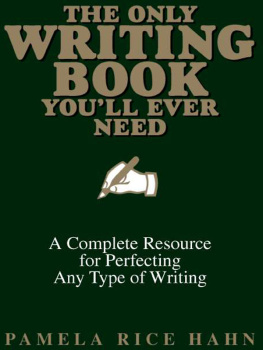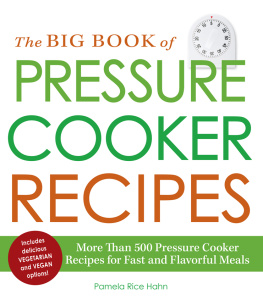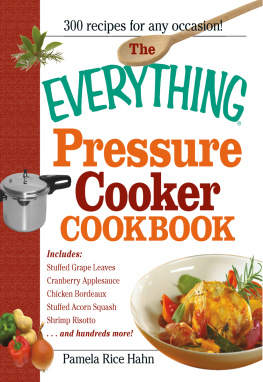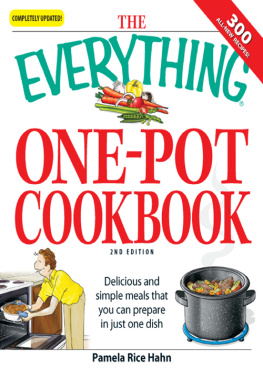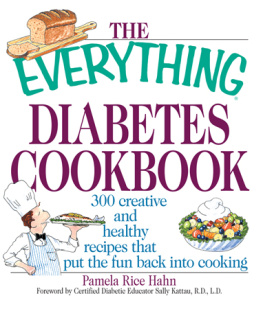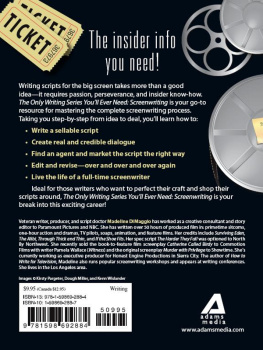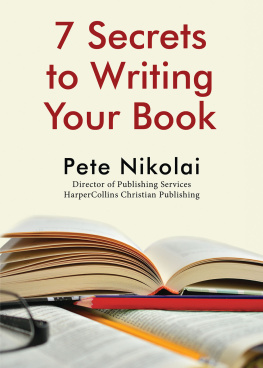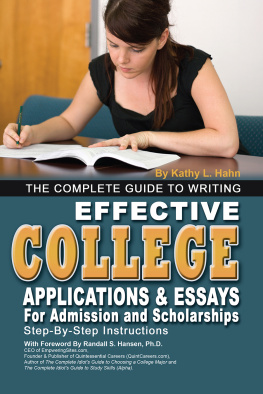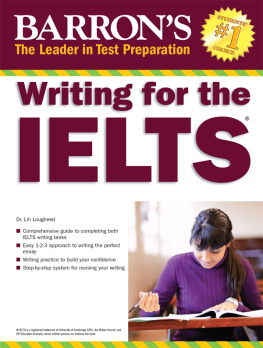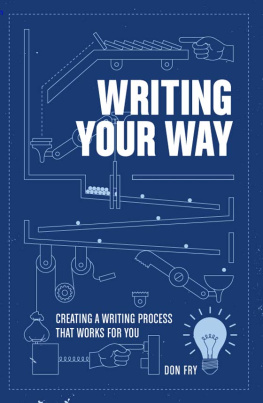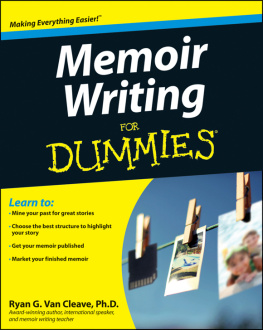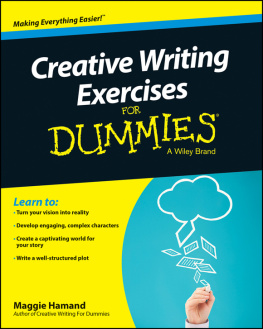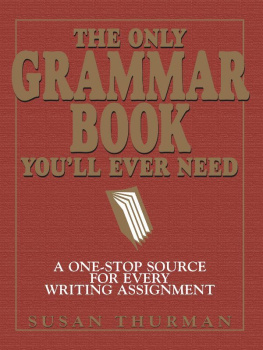
THE ONLY
WRITING BOOK
YOU'LL EVER NEED
A complete resource for perfecting any type of writing
Pamela Rice Hahn
Copyright 2005, F+W Media, Inc. All rights reserved. This book, or parts thereof,
may not be reproduced in any form without permission from the publisher; exceptions
are made for brief excerpts used in published reviews.
Published by Adams Media, a division of F+W Media, Inc.
57 Littlefield Street Avon, MA 02322
www.adamsmedia.com
ISBN 10: 1-59337-274-4
ISBN 13: 978-1-59337-274-3
Printed in Canada.
J I H G F E D C
Contains portions of material adapted and abridged from Te Everything Writing Well Book by Pamela Rice Hahn, 2003, F+W Media, Inc.
Library of Congress Cataloging-in-Publication Data
Hahn, Pamela Rice.
The only writing book youll ever need / Pamela Rice Hahn.
p. cm.
ISBN 1-59337-274-4
1. English languageRhetoricHandbooks, manuals, etc. 2. Academic writingHandbooks, manuals, etc. 3. Business writingHandbooks, manuals, etc. 4. Letter writingHandbooks, manuals, etc. I. Title.
PE1408.H2925 2005
808.042dc22
2004026349
This publication is designed to provide accurate and authoritative information with regard to the subject matter covered. It is sold with the understanding that the publisher is not engaged in rendering legal, accounting, or other professional advice. If legal advice or other expert assistance is required, the services of a competent professional person should be sought.
From a Declaration of Principles jointly adopted by a
Committee of the American Bar Association and
a Committee of Publishers and Associations
This book is available at quantity discounts for bulk purchases.
For information, please call 1-800-289-0963.
Contents
Introduction

S o this is The Only Writing Book You'll Ever Need. This book promises to deliver on a tall order. Polishing and perfecting all of your writing is an ambitious undertaking, indeed. Before we start extolling the virtues of this small volumeand all of the writing gems you will glean from itlet's consider why you need this book at all.
Perhaps when you think about writing, newspaper articles, books, or magazine features come to mind. Or maybe this subject drums up memories of writing high school and college-level research papers. You certainly will learn about the key principles of journalism and the essentials of academic essays in this book. But good writing isn't a skill relegated only to the realm of professional journalists, novelists, students, or teachers.
Think about those times when you're doing something as practical as sending a congratulatory note or preparing a resume to land a new job. Or maybe you're tackling something more complicated, like applying for grant funding or crafting a documentation plan for a technical document. Whatever the case might be, there will always be times in both your personal and professional life where you'll need to step up to the plate and give writing your best shot.
Good writing is about doing your research, organizing your ideas properly, and conveying information effectively. Ultimately, good writing skills equal good communication skills, and good communication is integral to all walks of life.
But good writing also doesn't just happen. Fewif anywriters can produce a perfect piece start to finish in one stream-of-consciousness burst of energy. (And if they tell you they can, they're probably lying.) Writing requires tenacity. It is an ongoing process of putting initial thoughts to paper, then editing, rereading, re-editing, and proofreading.
Be patient as your writing skills develop. At first, the process might seem difficult and frustrating, as you strive to hone your skills and get things right. With practice, however, it will get easier, until you reach a point where you intuitively know where you need to go with your thoughts and how you're going to get there.
Consider this book your basic introduction to planning, researching, organizing, and executing all sorts of writing projects. Until you do reach that point where writing becomes second nature, you'll need guideposts to help you stay on track. As you read this book, you'll encounter simple, distilled instructions as well as a wide range of examples to steer you in the right direction.
Don't be intimidated by writing. The simplicity of this slim guidebook should serve to assuage your fears, by helping you to find ways to hone your focus, stay on topic, develop coherent arguments, and even conquer writer's block when it strikes. And although this truly is The Only Writing Book You'll Ever Need, in the sense that it gives you the necessary tools to tackle a variety of tasks, don't stop here. If you intend to pursue any of the writing types detailed in this book further, consult other resources specific to your needs.
Continue reading and practicing, and your writing will continue to improve.
Chapter 1
Laying the Right Foundation

W hen it comes to writing, the most important thing is getting your point across. Writing is all about communication, and if you want to communicate properly, your messages must be clear and concise. This chapter will help you to understand the basic aspects of effective writing. By using the techniques in this book, your writing will become stronger, and readers will not only have confidence in you as a writer, they'll have more confidence in you as a person, too.
Before you set out to write any sort of message, there are a few decisions you first need to make. Sure, your plan of attack will vary depending on whether you are announcing your engagement, filing a letter of complaint, or writing a massive research paper. Despite the differences, however, any effective written message needs to answer the basic questions Who, What, When, Where, Why, and How. It also needs a solid beginning, middle, and end. As you develop the ins and outs of these main objectives, you also need to hone some troubleshooting techniques to avoid common mistakes many writers make. And once you get your ideas out onto the page, don't stop there. Spellcheck isn't the cure for all your woes, so never underestimate the value of editing and proofreading your work.
Addressing the Big Six
All writers, whether seasoned professionals or inexperienced novices, fear the dreaded blank page. Putting your thoughts into writing won't seem so daunting if you clearly define your big six questions. The first thing you'll need to do is consider whom you're writing for. Determine your audience by asking questions such as these:
Does your reader already know you?
Is your reader somebody in house, or will you be writing to somebody outside your center of influence?
Is your reader familiar with the topic?
Will your reader be receptive to what you're writing, or will you need to include any special motivation for continuing?
Will you need to anticipate and overcome any objections or any ambivalence?
Once you have a firm grasp on who your audience is, it's time to consider what, exactly, you're writing about. What kind of information do you plan to disseminate? The information you include and the approach you take will be quite different depending on whether you're writing an information piece about a new company procedure or a short story about survivors of a plane crash.
Next page
